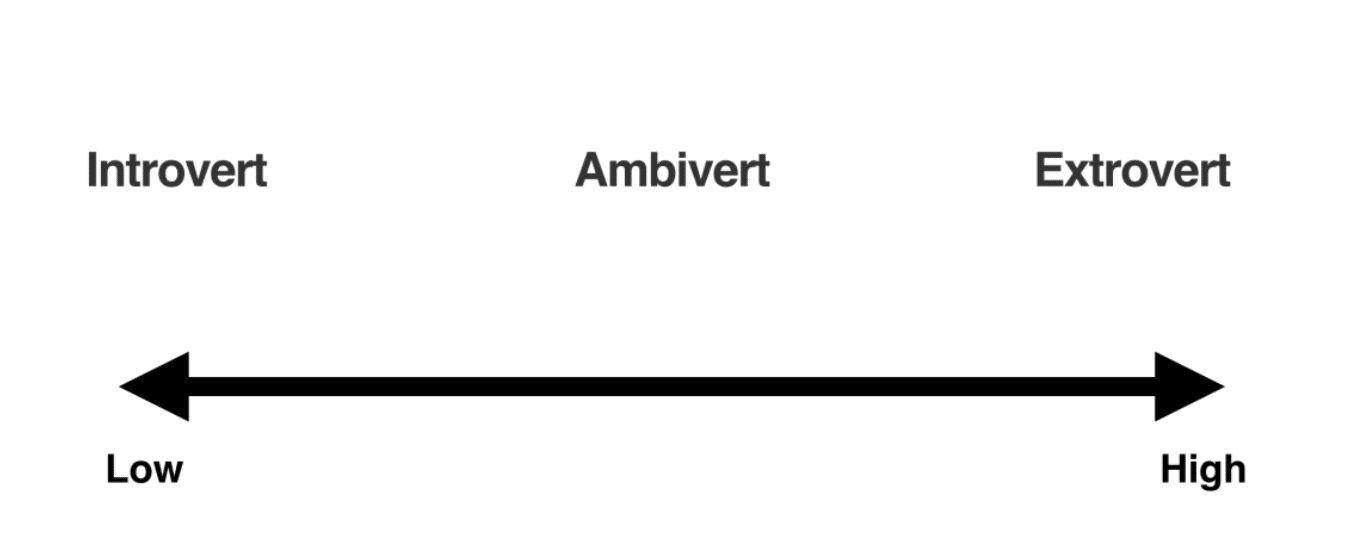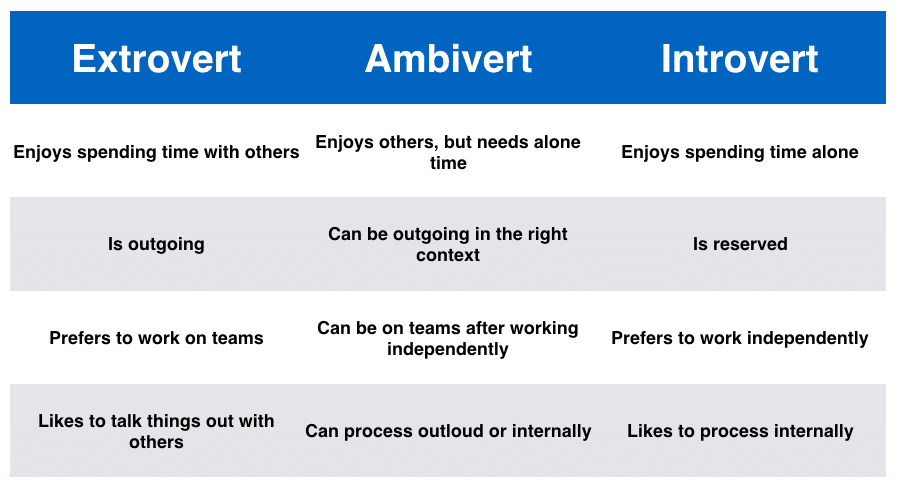Are you an introvert? Let’s dive into the definition of an introvert and how to leverage your introverted personality.
What is an introvert: Introverts tend to be more quiet and reserved. They seek solitude and prefer introspection to socializing.
However, introversion is a spectrum. All of our personality traits fall on a spectrum. Where do you think you fall?

But what does each label mean? Let’s review the difference between an introvert, extrovert and ambivert:
- Introvert: Someone who gets energy from solo time and focuses more on internal feelings rather than on external sources of stimulation.
- Ambivert: Someone who can exhibit qualities of both introversion and extroversion depending on the situation, mood and people they are with.
- Extrovert: Someone who loves being around people, gets energy from socializing and feels confident with new people.

If you aren’t sure, you could try looking in the mirror. We can tell a lot about someone’s personality from their face. This fascinating study did a drawing of two typical faces:

Most people don’t realize that much of our personality is genetic — in other words, personality is not a choice. You can’t just decide to be more extroverted one day.
This is a headache for many introverts.
Parents send them to camp and say: “Just be more friendly.”
Networking experts say, “Build your network and meet as many people as possible.”
Asking an introvert to be more outgoing is like asking them, “Please don’t be yourself.”
No more.
It’s time to use your introversion to your advantage instead of trying to change it.
Are You Really an Introvert?
Ok, did our quiz find you are definitely an introvert? Great! Read on for how to harness your power:
Your Incredible World View
Introverts have a different way of perceiving the world — and this is a huge advantage. The best example is in the classic ‘lemon juice experiment.’
“Introverts were found to salivate more than extroverts when a drop of lemon juice was placed on their tongue. The researchers theorized that introverts get triggered easily by their surroundings because they naturally possess higher level of arousal, which is why they prefer less intensive activities such as reading and writing rather than partying. Their preoccupation with their own thoughts is also what separates them from the crowd. Such “inward-orientedness” makes introverts unique souls with much to offer for the world which others often unwittingly overlook.” – Michael Poh
An Introverted Superpower
Studies have found that introverts are more humble than extroverts. Humility is an incredibly important — and hard to learn trait. It makes introverts more perceptive, more open and less bogged down by ego.
Humility is also associated with the desire to be of service to others.
This makes introverts wonderful leaders, managers and friends.
Why Introverts Make Amazing Leaders
When you ask someone to think of a highly charismatic person, they will often conjure up an image of a booming extrovert. But charisma comes in many flavors. In fact, introverted traits are very well suited to successful leadership roles. Here’s why:
- Introverts are wonderful observers. You pick up on social nuances, hidden emotions and team dynamics better than anyone. Don’t take this superpower for granted!
- When you speak, people listen. Since you tend to think carefully before speaking and use your words carefully, people take you seriously. Don’t ever feel pressured to engage in inane chit chat or make throw away comments to appease others. Speak when you are ready.
- Your quiet power is contagious.
Optimize Your Introversion
Don’t let anyone ever tell you to change your introversion–it’s SUCH an advantage. However, it is important for introverts to optimize their introversion for strength.
- Know exactly how you recharge. Have a big event coming up? Need a refresh? What do you do? Get your pre and post social routine down so you are in control.
- Find the perfect wingman. Who can be a great social partner for you? Will a friendly extrovert help you break into a crowd or overpower every conversation? Will a fellow introvert be a good partner in crime but discourage meeting new people? Can you find an ambivert to balance you out? Find your best event and socializing partner.
- Level up your body language…
Body Language for Introverts
You might not realize it, but even when you are not speaking, your body is saying something. Introverts need to be especially adept at nonverbal communication — both reading cues and sending cues. Here is a quick overview of some body language tips for introverts:
Tips for Introverts at Work
Have you noticed that many companies are switching to large open workspaces? This can be very hard for introverts. I interviewed my introverted colleague Shelly O’Donovan to get some great tips for introverts:
In a 2015 study by Oseland, it was confirmed that people who scored highly for introversion and neuroticism were more affected by noise than people who scored low on either variable. In this study, when all participants were asked specifically how noise affects the ability to work, a significant three-quarters of the respondents reported that they are negatively affected by noise in their workplace. Only 10% of participants thought that acoustics in their workplace had a positive effect on their performance. In addition, there are many studies that show that your choice in working environment is required to suit different activities and personalities. What can you do?
- Aim for flexibility. If you are a leader in this environment, consider some freedom for your employees. Not everyone thrives in an open environment. Some will get distracted; some will be distractors, while others will flourish. Knowing who needs what is key. As an employee, approach your manager, and in a positive manner ask for some flexibility and explain why you need it. Introverts tend to be thinkers; they often need quiet spaces to contemplate and to crank out work. While extroverts think out loud, they often talk through something before they pen it. This means that introverts could struggle in an open environment if they are not given that flexibility. Flexibility could mean work from home days each week, privacy pods to take calls from or to think through projects, or the ability to use the resources available in the community. One open space organization is championing flexility by allowing its workers to go to the library next door when they need to research a project–not because the library has resources–but because it is quiet.
- Take care of yourself. Introverts require some quiet time to recharge while extroverts require socialization to recharge. As an introvert, you need that time. For someone who is in that open environment all day, coming home to a busy house or a second job at night can be overwhelming. Build in quiet time for yourself. This could mean spending two hours in open space and then hiding away for 10 minutes in a quiet corner of the cafeteria while you recharge your battery. It could mean that you turn off the radio on your drive home and have some quiet car time or sit in your car at lunch for a break. Take care of yourself and give yourself that time to decompress.
- Ask to have quiet times. Noise can cause distraction at work. Set aside a few key slots during your day to find a quiet place to work. If you can disappear into a pod for an hour or two you can accomplish amazing amounts of work because you have the peace and quiet to focus on it.
- Shift your hours. Could you shift your hours an hour or so in either direction? It may not be possible, although if you can, you may be able to get into the office early and start working before it is full. This will give you that quiet time you need to properly focus.
- Don’t eat at your desk. You need a break from that open environment and lunch is the perfect time. Lunch with a friend outside the office can help you recharge, or go for a walk or a ride in your car. Just sit in a quiet place and recharge! Thriving in any environment means taking care of yourself. It is important to know your personality and what you need to make it work. Give yourself permission to figure that out.
Are you managing introverts or many different personality types? Learn how to be a good manager based on personality!
How Introverts Can Be Heard in Meetings
Do you dread meetings? Introverts sometimes dread the open cattle call of meetings — having to brainstorm out loud, being randomly called on or being forced into icebreakers (even if they are non-awkward).
A classic introvert preference is an aversion to meetings. It may seem justified by the fact that the introvert skill set – one-on-one interaction, confidence to work alone, research and contemplation skills – does not lend itself to a conference room scenario. However, a truly professional introvert will learn to capitalize on those skills not just in their natural habitat, but in apparently unsuitable contexts such as the business meeting. Here’s the problem:
Not knowing how to excel in the meeting process is holding back your career.
I asked my introverted friend G. John Cole to give me some tips for introverts in meetings. Here’s what he said:
- Form opinions in advance. As an introvert, you should aim to get your best thinking done before you even enter the room. Get hold of the agenda early, research the topics and the stats, and prepare some thoughts and ideas. You’ll find it much easier to cut in ahead of your outgoing colleagues if you have the confidence to state your take, and the material to back it up.
- Be first to the meeting room. Build your confidence by getting used to the sound of your voice before you get started. Go over your ideas with a friend or partner so you get to hear them out loud. And show up early for the meeting so that you can build trust with your colleagues face-to-face as they arrive, instead of dreading that moment in the meeting when everyone notices you for the first time.
- Engage at your own pace. You can build confidence and have a meaningful impact upon the outcome of a meeting by speaking up early. If you get a chance to introduce the meeting or present some research while the mood is still being set, you can create a framework within which your colleagues can develop your ideas. Speak up early – but don’t allow yourself to be rushed. Your mind operates how it operates, and if you’re pressed for a quick response from a colleague who is interested in – or critical of – your idea, responding before you’re ready may end up in disaster.
- Ask for more time if needed. If you are rushed to give your opinion, calmly state that you need a moment to think, that you’ll get back to them shortly, or that you need to look into the matter after the meeting.
- Follow up afterwards. Your meeting game doesn’t end with the scraping of chairs and the rush for the coffee machine. You’re an introvert, right? There’s important work to be done from the security of your desk. You can capitalize on that summing-up technique from the end of the meeting by sending out minutes and follow-up emails where appropriate. Don’t make a habit of saving your ideas until the meeting’s over, but if a bit of post-meeting research opens up a fresh angle on your take then by all means share it. It may take you a while to digest new information from the meeting, so if a colleague made a point that you found interesting consider meeting up with them one-on-one to develop the thought further.
Want to get to know your fellow colleagues? Read up on Ambiverts and Extroverts.
Remember: There is no right or wrong personality type. The only right thing to do is to leverage your natural strengths. Your introversion is a gift, never forget it!
